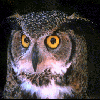
Home-brewed!!
Of course, those of you who know me well also know that I am fascinated with every aspect of astronomy and more than willing to experiment with any type of equipment. For the last year or so, it has been an on-going project of mine to perfect radio meteor listening.
Have I cracked? Not hardly, brothers... This is a simple techinque using simple equipment, and the results have been outstanding!
My first experience was during the second Leonid "storm". (we all remember the first, don't we? ;) As you may recall, it was raining that night and I was very disappointed that we wouldn't get to see such a spectacular showing. Cruising the internet in hopes of finding a "live" broadcast, I started running into articles on how to do your own radio meteor listening. One that came highly recommended was using a television set and antenna! As luck would have it, I had a television antenna a recent tornado uprooted, and an old television in the garage slated for disposal. Could this work? Why the heck not try it?
So, by running the cable to the TV set, balancing the antenna on an aluminum chaise lounge frame and turning the volume up to full blast (who cares if the horizontal hold is dead?) I recorded my very first meteor sounds by using my video camera as a recorder.
Holy Corvus! This stuff's for real!
Of course, there is a lot of reverberation in this caused by the fact the set was on full blast and echoing in the garage... But what an incredible capture! (and lord help me if any of the neighbors saw me sitting in the garage in the middle of the night listening to static at extinction level... worse yet recording it with a video camera. ;))
The next day I immediately contacted a computer wiz friend and co-astronomer who also belongs to SETI. Confirmation is the name of the game. Converting the "sounds" I had recording into electronic data, we compared it to other known meteor recordings.
Paydirt.
After that, I was hooked. But the time had come to dispose of the junky lawn chair and get rid of the broken television. I had heard, and read, that better results come from using an FM antenna and a "dead" frequency. Very quickly, the radio went from listening to rock and roll during observing sessions - to listening to meteors. I gotta' tell ya', it's really amazing to be outside observing and catch a random as well as "hear" its' signature squeal! Although I make no attempt to record these sounds while observing... It works.
My next opportunity for a clouded-out meteor shower came with the Geminids. And once again? I am on it. The huge, old fashioned speakers in the garage rock out all the subtle tones and reverberations with ease. And all it takes? Is just enough video footage to capture that sound...
Again, I couldn't have been more pleased. When the 2004 season rolled around and we were due for the Quadrantids? You got it. Clouded out. Now I've got another situation to deal with... It's blazing cold out there as well. Can I step this into another level? Why not! It's all in where the antenna is positioned... Not the receiver. So, running the feed line back into the house, I connected it with the surround sound system and placed the tuner on a non-used frequency. Nada. Nothing but static.
I gave up and went to bed, but reset my alarm clock for the expected peak around 4:00 a.m. When I turned the receiver on, I was blown away! Snatches of all different types of radio programs, (since when do you hear jazz, rock and roll and country and western on the same station? doesn't happen.) along with those signature tones I've come to know and love! The very best of these is a long, low key, very bass thrum... Unfortunately for surround sound, those tones come out of other speakers, but I was willing to try to record it with the video camera on the one that sends out the most tones:
Of course, being blonde I realize entirely too late the system has a built in cassette recorder and I could have easily and cheaply recorded the whole event... But hey! I'm not giving up.
Now that's more like it! At least using the video camera I can listen and well as see a counter so I can play back the recordings for archive purposes. One more before I go?
As you can see, radio astronomy isn't just for the scientists! It's something YOU, too, can do with ease... And it is not dependent on a dark sky site, nor even clear skies! Since my ear seems to detect a lot of difference between each meteor shower, (yeah, the slow ones mean miles of static.) I hope in the future to continue to record different meteor showers and save their sounds for future comparison. (or cloudy nights... whichever comes first.) It's fun and it's easy! And it's a trick I later learned that ham radio operators use to acquire signals they normally wouldn't....
Try it yourself!! (if not? i'll just go stand quietly in the corner and keep listenin' in... ;)
